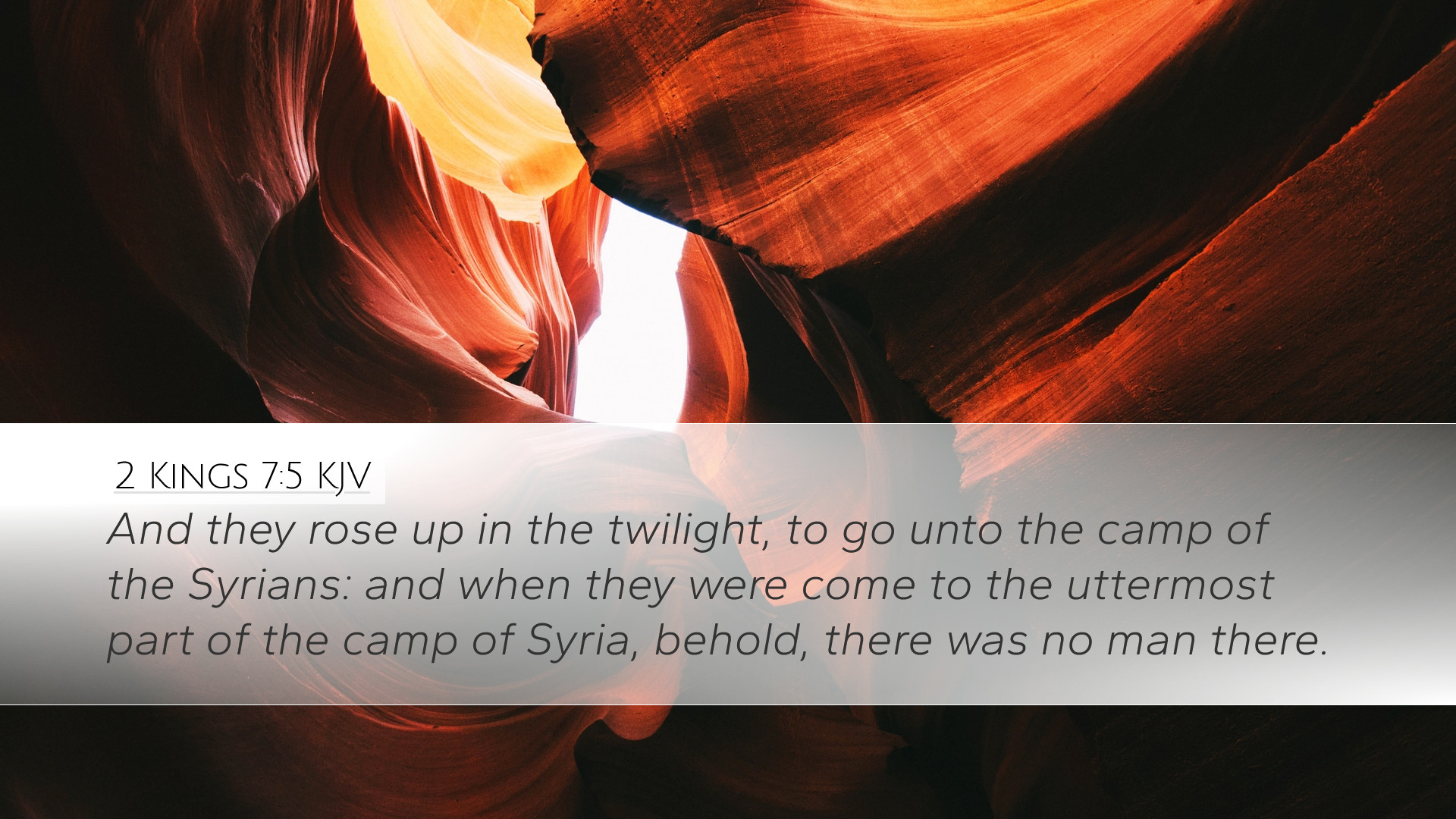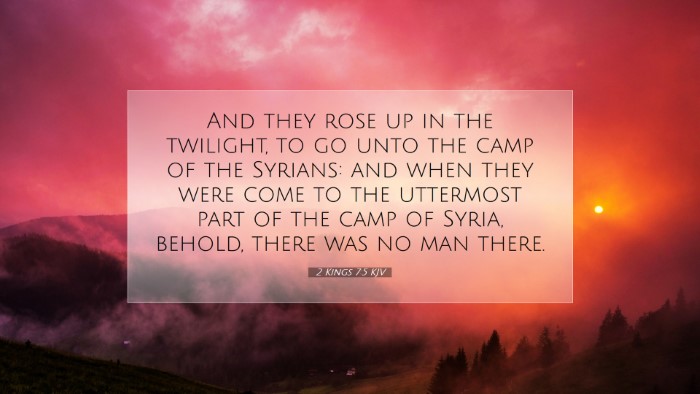Old Testament
Genesis Exodus Leviticus Numbers Deuteronomy Joshua Judges Ruth 1 Samuel 2 Samuel 1 Kings 2 Kings 1 Chronicles 2 Chronicles Ezra Nehemiah Esther Job Psalms Proverbs Ecclesiastes Song of Solomon Isaiah Jeremiah Lamentations Ezekiel Daniel Hosea Joel Amos Obadiah Jonah Micah Nahum Habakkuk Zephaniah Haggai Zechariah Malachi2 Kings 7:5
2 Kings 7:5 KJV
And they rose up in the twilight, to go unto the camp of the Syrians: and when they were come to the uttermost part of the camp of Syria, behold, there was no man there.
2 Kings 7:5 Bible Commentary
Commentary on 2 Kings 7:5
Verse Analysis: "And they rose up in the twilight, to go unto the camp of the Syrians: and when they were come to the uttermost part of the camp of Syria, behold, there was no man there." (2 Kings 7:5, KJV)
Contextual Background
This verse is situated in a dramatic narrative depicting the plight of the besieged city of Samaria during the reign of King Joram. The city faced famine due to the prolonged siege laid by the Syrians. The plight of the Israelites was dire, and the situation had spawned instances of desperation and despair, previously detailed in the earlier verses of the chapter.
Commentary Insights
-
Matthew Henry's Commentary:
Matthew Henry notes the courage and initiative of the lepers, who took the first step towards liberation from their plight. They exemplified faith in action, choosing to venture into enemy territory rather than remaining in their stalled circumstance. Henry emphasizes the significance of their timing, stating that their departure at twilight indicates a divine orchestration, as God often works in unexpected and subtle ways.
-
Albert Barnes' Notes:
Barnes highlights the contrast between the lepers and the city of Samaria. While the people of Samaria waited in despair, the lepers acted by faith. Their decision to move was pivotal, as it was a critical turning point that led to the eventual deliverance of the city. Barnes also reflects upon the implications of the lepers’ choices and actions, noting that sometimes individuals on the margins, like the lepers, may be used by God to bring about significant change.
-
Adam Clarke's Commentary:
Clarke draws attention to the poverty and desperation that drove the lepers to seek help from the Syrians, commenting on the broader theme of hope amidst hopelessness. He suggests that their condition as lepers, outcasts from society, amplifies the miracle of their deliverance. Clarke uses this narrative to illustrate God's sovereignty and providential care, emphasizing that divine interventions often come through the unlikeliest of individuals.
Theological Themes
This verse underscores several key theological themes that resonate through the text:
- Faith and Action: The lepers' choice to rise at twilight illustrates active faith. Their faith was not silent; it compelled them to act in uncertain circumstances, which is a model for believers to engage in steps of faith despite fears and doubts.
- Divine Providence: The absence of soldiers in the Syrian camp reflects God's providence. God, who often works behind the scenes, can turn the tide of evil and despair into unexpected triumph, demonstrating His authority over nations and earthly powers.
- Hope in Desperation: The lepers, marginalized and desperate, became instruments of God's deliverance. This serves as a powerful reminder that God often chooses the weak and foolish to achieve His purposes, providing hope to those who feel hopeless.
Practical Applications
For pastors, students, and theologians, this commentary on 2 Kings 7:5 offers rich opportunities for application:
- Encouragement to Act: Reflect on how faith prompts action. Encourage congregants to step out in faith within their own contexts, recognizing that inaction can lead to spiritual stagnation.
- God's Sovereignty: Relate this passage to discussions on God’s control over history, fostering a deeper trust in His timing and provision in the midst of crises.
- Redefining Outsiders: Utilize the example of the lepers to challenge congregations to view those who are marginalized or considered ‘outsiders’ with the eyes of Christ, affirming that they may be key to God's work.
Conclusion
Totaling the insights from these scholars, 2 Kings 7:5 serves as a powerful narrative infused with themes of faith, divine intervention, and hope. The story encourages believers to respond actively to God’s calling, trust in His providential care, and recognize that transformation can often come from the most unexpected places. The lepers exemplify how acts of courage and faith can lead to profound change, illustrating that God’s hand is at work, often beyond our immediate sight.


